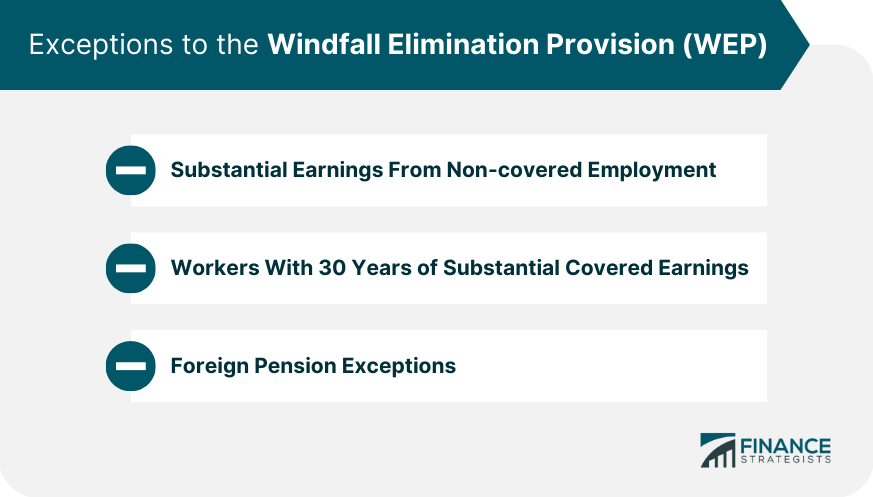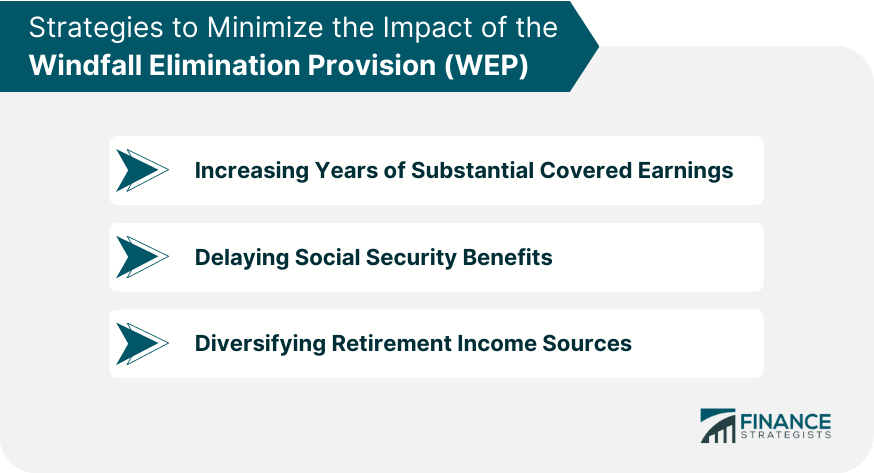The WEP is a provision in the United States Social Security system that reduces the benefits for certain individuals who receive pensions from employment not covered by Social Security. It was enacted in 1983 to address perceived inequities in the Social Security benefit formula for workers with both covered (Social Security-taxable) and non-covered (non-Social Security-taxable) earnings. The WEP primarily affects individuals who receive a pension from a non-covered employer, such as federal, state, or local government employees, and who also qualify for Social Security benefits based on their covered employment. The WEP modifies the formula used to calculate Social Security benefits for affected individuals, resulting in a lower benefit amount than they would receive under the standard formula. The amount by which the WEP reduces an individual's Social Security benefits depends on several factors, including the number of years of substantial covered earnings and the year they become eligible for benefits. The WEP may also impact the Social Security benefits of spouses and survivors of affected individuals, as their benefits may be based on the reduced benefit amount. The WEP does not apply to individuals who have substantial earnings from non-covered employment that are also subject to Social Security taxes. Workers who have 30 or more years of substantial covered earnings are exempt from the WEP. The WEP reduction is also gradually phased out for workers with between 21 and 29 years of substantial covered earnings. In some cases, individuals who receive a foreign pension based on non-covered employment may be exempt from the WEP. The WEP affects individuals who receive a pension from non-covered employment and qualify for Social Security benefits based on their covered employment. On the other hand, the Government Pension Offset (GPO) affects individuals who receive a government pension and also qualify for Social Security spousal or survivor benefits based on their spouse's covered employment. In some cases, individuals may be subject to both the WEP and the GPO, which can significantly reduce their Social Security benefits. One strategy to minimize the impact of the WEP is to increase the number of years of substantial covered earnings, as the WEP reduction is phased out for workers with more years of covered earnings. Delaying the receipt of Social Security benefits can help offset the impact of the WEP, as benefit amounts increase with each year of delayed retirement, up to age 70. To minimize the impact of the WEP on retirement income, individuals can diversify their income sources by contributing to retirement savings plans, such as IRAs or employer-sponsored plans, and exploring other investment opportunities. Critics of the WEP argue that it unfairly penalizes individuals who have divided their careers between covered and non-covered employment and that it disproportionately affects lower-income workers. Several legislative proposals have been introduced to modify or eliminate the WEP, aiming to create a more equitable benefit calculation method or provide relief for affected individuals. If the WEP is reformed or eliminated, it could result in increased Social Security benefits for affected individuals. However, such changes could also have implications for the overall solvency of the Social Security system, depending on the specific reforms enacted. The Social Security Administration (SSA) provides resources and information about the WEP on its website, including a fact sheet, frequently asked questions, and detailed explanations of the WEP calculations. Several online WEP calculators are available to help individuals estimate the potential impact of the WEP on their Social Security benefits, allowing them to make more informed decisions about their retirement planning. Individuals affected by the WEP may benefit from seeking professional financial advice to understand the potential impact on their retirement income and explore strategies for minimizing the WEP's effects. It is crucial for individuals who may be affected by the Windfall Elimination Provision to understand how it works and how it may impact their Social Security benefits, as well as their spouse's or survivor's benefits. Being informed can help them make better decisions about their retirement planning and advocate for potential changes to the WEP. There are several strategies that individuals can employ to minimize the impact of the WEP on their retirement income, such as increasing their years of substantial covered earnings, delaying the receipt of Social Security benefits, and diversifying their retirement income sources. These strategies can help ensure a more secure financial future for those affected by the WEP. As advocacy and legislative efforts continue, the future prospects for WEP reform remain uncertain. Individuals affected by the WEP should stay informed about potential changes and consider how they may affect their retirement planning.What Is the Windfall Elimination Provision (WEP)?
How the Windfall Elimination Provision Works
Calculation of Social Security Benefits under the WEP
Factors Affecting the WEP Reduction
WEP's Impact on Spouse and Survivor Benefits
Exceptions to the Windfall Elimination Provision
Substantial Earnings From Non-covered Employment
Workers With 30 Years of Substantial Covered Earnings
Foreign Pension Exceptions

WEP and Government Pension Offset (GPO)
Differences Between WEP and GPO
Situations Where Both WEP and GPO May Apply
Strategies to Minimize the Impact of WEP
Increasing Years of Substantial Covered Earnings
Delaying Social Security Benefits
Diversifying Retirement Income Sources

Advocacy and Legislative Efforts on WEP
Arguments Against the WEP
Proposed Changes to the WEP
Potential Impacts of WEP Reform
Resources and Tools for Understanding the WEP
Social Security Administration's WEP Resources
Online WEP Calculators
Professional Financial Advice
Conclusion
Windfall Elimination Provision (WEP) FAQs
The WEP is a provision that reduces the Social Security benefits of individuals who receive pensions from jobs that did not pay Social Security taxes. This is because these individuals may be receiving a "windfall" from their non-Social Security-covered employment that makes their Social Security benefits appear higher than they would be otherwise.
The Windfall Elimination Provision affects individuals who receive a pension from a job that did not pay Social Security taxes and who are also eligible for Social Security benefits based on their own work history. The provision can also affect individuals who are eligible for both Social Security benefits and spousal or survivor benefits based on their spouse's or former spouse's work history.
The Windfall Elimination Provision reduces the Social Security benefits of affected individuals by a certain percentage, based on a formula that takes into account the number of years the individual worked in jobs that did not pay Social Security taxes and the amount of earnings from those jobs. The reduction can be no more than one-half of the individual's non-Social Security pension.
There are some exceptions to the Windfall Elimination Provision that may reduce or eliminate the reduction in Social Security benefits. For example, individuals who have 30 or more years of substantial earnings under Social Security may not be subject to the full reduction. In addition, the WEP does not apply to individuals who receive certain types of non-Social Security pensions, such as those from government jobs in some foreign countries.
You can find out if the Windfall Elimination Provision applies to you by contacting the Social Security Administration (SSA) and providing information about your work history and pension. The SSA can calculate your estimated Social Security benefits with and without the WEP and provide you with information about any reduction in benefits. It is also important to note that some state and local government pension systems may not participate in Social Security, which could also affect your eligibility for Social Security benefits.
True Tamplin is a published author, public speaker, CEO of UpDigital, and founder of Finance Strategists.
True is a Certified Educator in Personal Finance (CEPF®), author of The Handy Financial Ratios Guide, a member of the Society for Advancing Business Editing and Writing, contributes to his financial education site, Finance Strategists, and has spoken to various financial communities such as the CFA Institute, as well as university students like his Alma mater, Biola University, where he received a bachelor of science in business and data analytics.
To learn more about True, visit his personal website or view his author profiles on Amazon, Nasdaq and Forbes.















